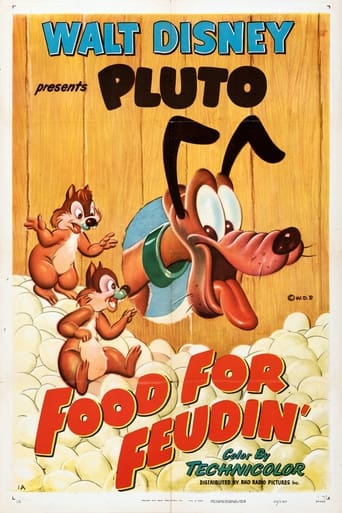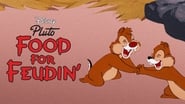TheLittleSongbird
I have loved Disney and animation in general. Food for Feudin' is a fun cartoon. Like some of the Disney cartoon shorts, the story is predictable and nothing to rave about. However, it is vibrantly animated with fluid backgrounds and colours that do look rich and energetically scored. The humour as is the case with any cartoon with Chip 'n' Dale is sight-gag driven, and Food for Feudin' is very amusing, especially the gag with the hands. Plus the ending is a nice touch. Chip 'n' Dale are very cute and antagonistic, once you get over the fact that what they say is unintelligible, and Pluto is a good foil, if not as entertaining as Donald, whose personality with the chipmunks contrasted better. All in all, Food for Feudin' is fun. 8/10 Bethany Cox
Ron Oliver
A Walt Disney PLUTO Cartoon.Chip 'n' Dale's store of Winter nuts become FOOD FOR FEUDIN' when they all end up in Pluto's doghouse.More typical trouble between the Chipmunks & the Pup - enjoyable to watch, but it's all been done before. Chip 'n' Dale's dialogue is almost completely unintelligible.Walt Disney (1901-1966) was always intrigued by pictures & drawings. As a lad in Marceline, Missouri, he sketched farm animals on scraps of paper; later, as an ambulance driver in France during the First World War, he drew comic figures on the sides of his vehicle. Back in Kansas City, along with artist Ub Iwerks, Walt developed a primitive animation studio that provided animated commercials and tiny cartoons for the local movie theaters. Always the innovator, his ALICE IN CARTOONLAND series broke ground in placing a live figure in a cartoon universe. Business reversals sent Disney & Iwerks to Hollywood in 1923, where Walt's older brother Roy became his lifelong business manager & counselor. When a mildly successful series with Oswald The Lucky Rabbit was snatched away by the distributor, the character of Mickey Mouse sprung into Walt's imagination, ensuring Disney's immortality. The happy arrival of sound technology made Mickey's screen debut, STEAMBOAT WILLIE (1928), a tremendous audience success with its use of synchronized music. The SILLY SYMPHONIES soon appeared, and Walt's growing crew of marvelously talented animators were quickly conquering new territory with full color, illusions of depth and radical advancements in personality development, an arena in which Walt's genius was unbeatable. Mickey's feisty, naughty behavior had captured millions of fans, but he was soon to be joined by other animated companions: temperamental Donald Duck, intellectually-challenged Goofy and energetic Pluto. All this was in preparation for Walt's grandest dream - feature length animated films. Against a storm of naysayers, Walt persevered and over the next decades delighted children of all ages with the adventures of Snow White, Pinocchio, Dumbo, Bambi & Peter Pan. Walt never forgot that his fortunes were all started by a mouse, or that childlike simplicity of message and lots of hard work always pay off.



